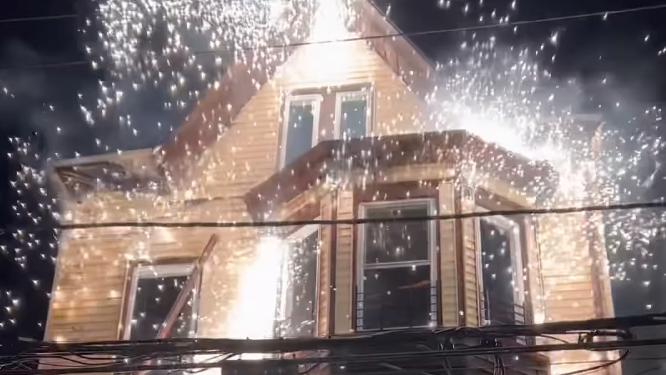Is Aluminum Siding on Your Home Dangerous?

"Hearst Magazines and Yahoo may earn commission or revenue on some items through these links."
The three little pigs might've taught us about the cons (and occasional pros) of building a house out of sticks, straw, and bricks, but the big bad wolf never tried his luck with aluminum. Maybe that's because, under the right circumstances, it can be incredibly dangerous. Don't believe us? Just ask the fire department of Paterson, New Jersey. It was business as usual when a crew of firefighters were responding to a few fire alarms—that is, until a gust of wind blew through the area. The building's aluminum siding came into contact with the electrical line service, resulting in the aluminum becoming energized. (Someone caught the entire thing on video so you can see it for yourself.)
While it's not every day you see a facade firework show that belongs in a blockbuster action movie, this situation can happen. But how? "Unlike materials like vinyl or wood, aluminum is an excellent conductor of electricity," Aaron Brilliant, owner and general manager of Emerald Roofing and Siding in Baltimore, Maryland, says. "If that bare wire touches the siding, it creates a path for the current to flow."
Aluminum Siding Safety
For an electrical system to be considered safe—be it near aluminum siding or otherwise—Brilliant says there needs to be a proper grounding path, which is a conductive route that allows the electric current to flow safely from an electrical device or system to the ground. Often made of connecting metal components or conductors to the ground, a ground path typically prevents the accumulation of excess voltage and reduces the risk of electrical hazards such as fires or shocks like the one the Paterson Fire Department witnessed.
"When installed correctly by a qualified electrician who ensures proper grounding, aluminum siding is generally safe," Brilliant says. "However, older homes might have outdated wiring or issues with the grounding system that make the siding a potential hazard."
To exercise caution, Brilliant says it's a good idea to hire a professional to do regular electrical inspections. Between inspections, you'll also want to be cognizant of your surroundings. "Don't place ladders or other metal objects against aluminum siding." he warns. "They could become conductors as well."
Aluminum might be known for its strength and durability, but if the idea of metal mayhem really terrifies you, there are alternatives. For example, vinyl siding and fiber cement are excellent options that aren't conductors. Or, you might want to double down on your home's insulation. Brilliant says: "Some types of siding have a layer of insulation that adds both thermal protection and an extra barrier against electrical issues."
Regardless of what the solution is, here's to keeping the conversation-sparking ideas to your decor—not your home's exterior.
Working on a design project? Let us help!
Follow House Beautiful on Instagram and TikTok.
You Might Also Like

